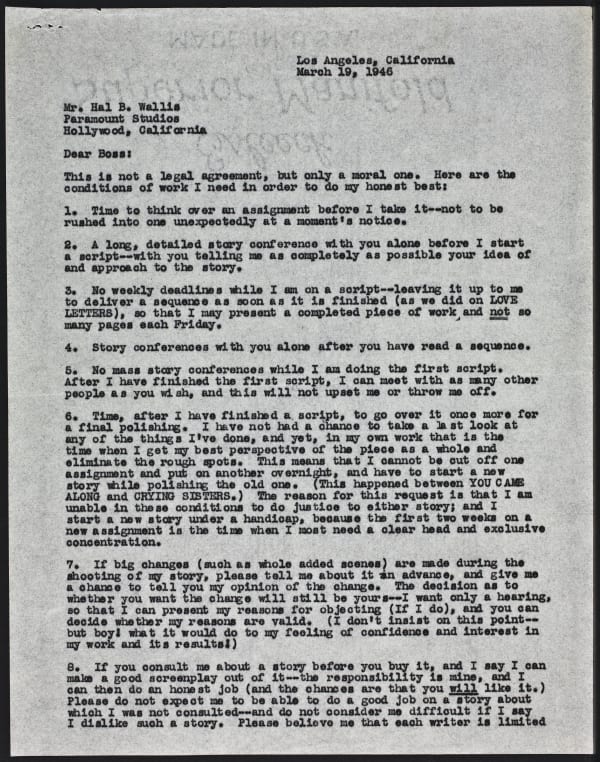
[Page 1]
Los Angeles, California
March 19, 1946
Mr. Hal B. Wallis
Paramount Studios
Hollywood, California
Dear Boss:
This is not a legal agreement, but only a moral one. Here are the conditions of work I need in order to do my honest best:
1. Time to think over an assignment before I take it—not to be rushed into one unexpectedly at a moment’s notice.
2. A long, detailed story conference with you alone before I start a script—with you telling me as completely as possible your idea of and approach to the story.
3. No weekly deadlines while I am on a script—leaving it up to me to deliver a sequence as soon as it is finished (as we did on LOVE LETTERS), so that I may present a completed piece of work, and not so many pages each Friday.
4. Story conferences with you alone after you have read a sequence.
5. No mass story conferences while I am doing the first script. After I have finished the first script, I can meet with as many other people as you wish, and this will not upset me or throw me off.
6. Time, after I have finished a script, to go over it once more for a final polishing. I have not had a chance to take a last look at any of the things I’ve done, and yet, in my own work that is the time when I get my best perspective of the piece as a whole and eliminate the rough spots. This means that I cannot be cut off one assignment and put on another overnight, and have to start a new story while polishing the old one. (This happened between YOU CAME ALONG and CRYING SISTERS.) The reason for this request is that I am unable in these conditions to do justice to either story; and I start a new story under a handicap, because the first two weeks on a new assignment is the time when I most need a clear head and exclusive concentration.
7. If big changes (such as whole added scenes) are made during the shooting of my story, please tell me about it in advance, and give me a chance to tell you my opinion of the change. The decision as to whether you want the change will still be yours—I want only a hearing, so that I can present my reasons for objecting (If I do), and you can decide whether my reasons are valid. (I don’t insist on this point—but boy! what it would do to my feeling of confidence and interest in my work and its results!)
8. If you consult me about a story before you buy it, and I say I can make a good screenplay out of it—the responsibility is mine, and I can then do an honest job (and the chances are that you will like it.) Please do not expect me to be able to do a good job on a story about which I was not consulted—and do not consider me difficult if I say I dislike such a story. Please believe me that each writer is limited
[Page 2]
Page 2 Mr. Hal B. Wallis March 19, 1946
to a certain kind of thing, and that he is unable to do anything and everything equally well.
9. Whenever you have something important to tell me (like last Saturday)—please tell me yourself, not through a third person.
10. If at any time you are displeased by my personal attitude, or feel that I am becoming unreasonable, difficult, temperamental or arrogant, please call me in at once and tell me so, in order not to let a misunderstanding grow out of what one word could have corrected.
If this meets with your approval, I think we will both be very happy and the results will show in my work.
Sincerely yours,
_____________
Ayn Rand
AR: j
The Ayn Rand Archives contains no written response from Wallis re AR’s proposed working conditions.